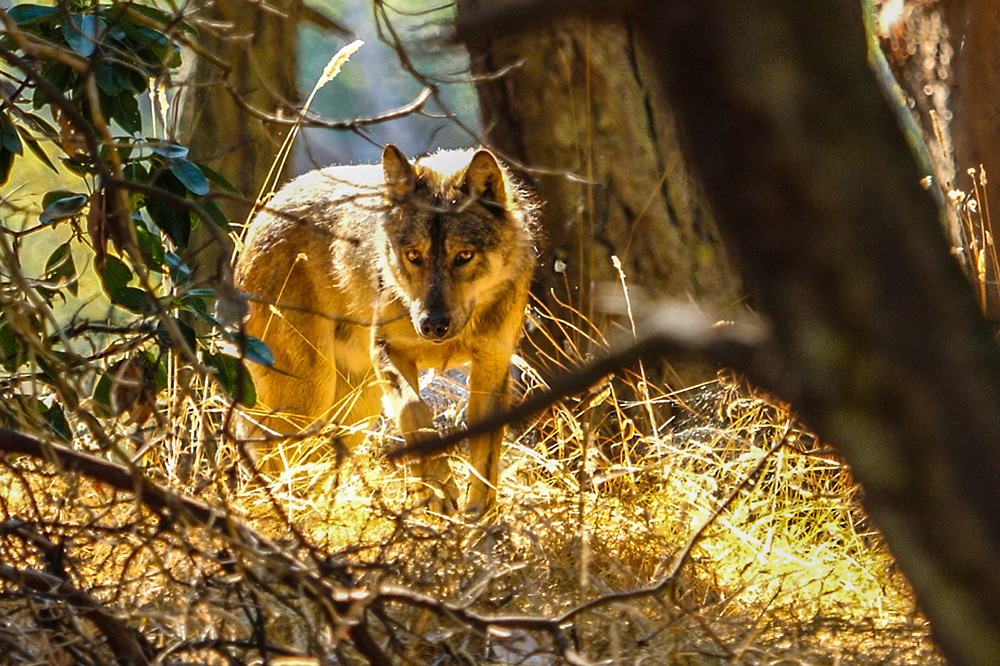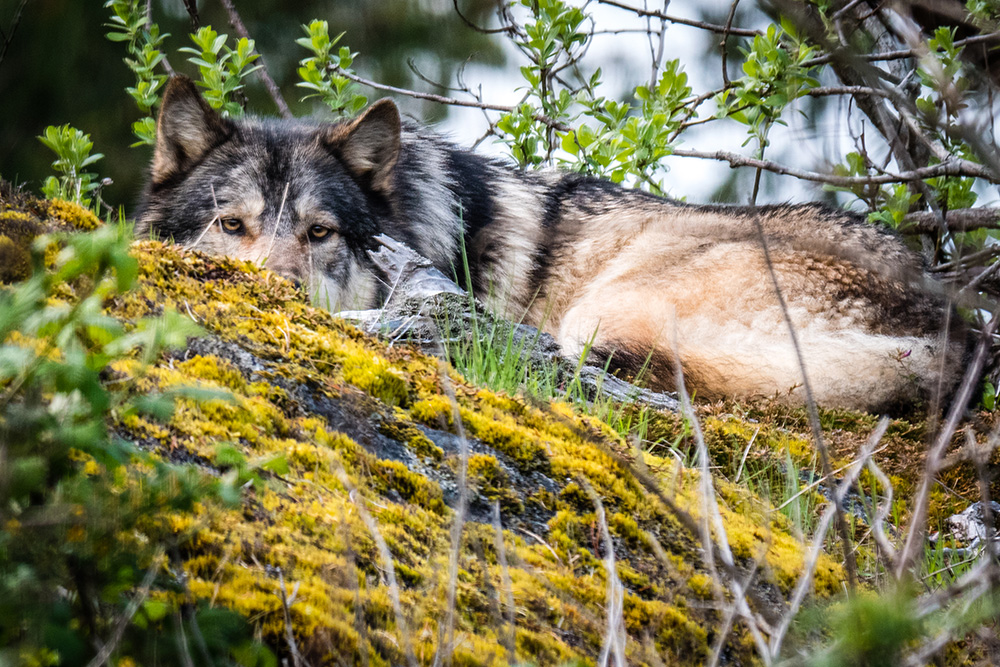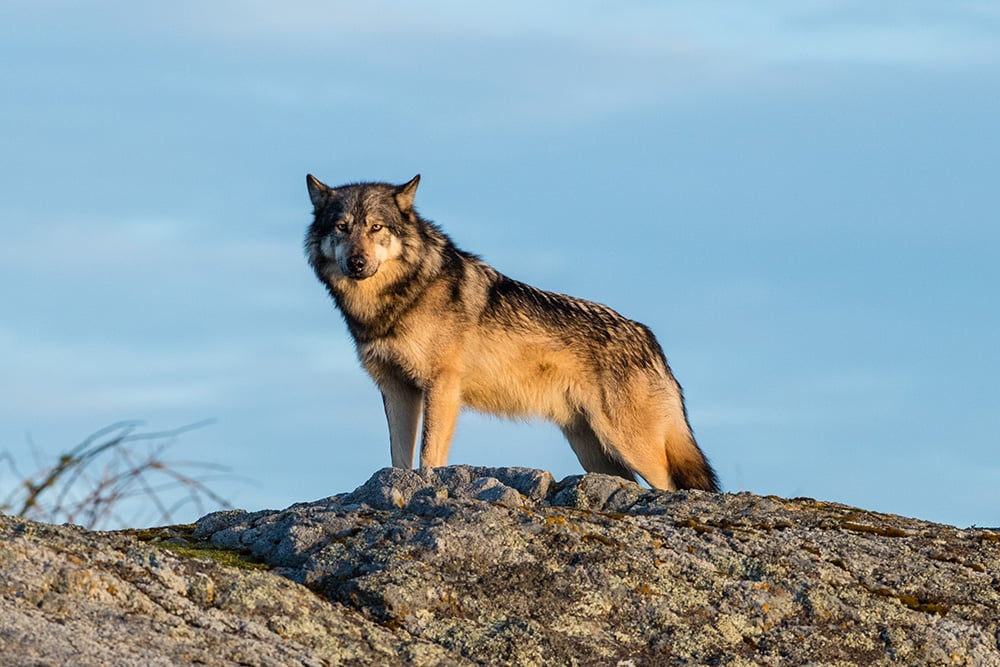The image of a lone wolf brings up a welter of emotions. Fear, fascination, curiosity and caution. But for author Cheryl Alexander, the overarching feeling was one of wonder as she came to know a wolf named Takaya. Alexander’s experience, documented in photographs and essays, forms the spine of her new book Takaya: Lone Wolf.
One-part science to two-parts poetry, Alexander’s approach is a deeply personal one, alternating between worry for Takaya’s safety and fascination with the ongoing details of his daily life — food, shelter and even, occasionally, company. Capturing the quotidian details of Takaya’s time on an uninhabited island only a few kilometres from Victoria, something else becomes apparent, namely the human need for wild things.
The process of coming to know, understand and ultimately respect the nature and dignity of another living creature is at the heart of the book. In this, it takes a place alongside other narratives by Farley Mowat, and the great Jane Goodall. As Goodall writes of Alexander’s book, “It is only if you observe a complex animal over time, and with an open mind and heart that you can get a true understanding of the sentience of that animal, his or her being-ness.”

The issue of animal sentience has been long established. What is more critical now is the idea of rights — that animals, as well as humans, have an inalienable right to life, freedom and territory.
The sad ending of Takaya’s story says something about those rights. After venturing into Victoria he was captured and relocated to an area near Port Renfrew, where he was shot and killed by a trophy hunter in the spring of 2020. But from this place of sadness and loss, Alexander has fashioned a testimony to life. Not just to wolves alone, but to the richness of animals, plants, ocean and land that make up the place that Takaya once called home.
‘Wonder,’ an excerpt from Takaya: Lone Wolf (RMB, 2020)
By Cheryl Alexander
And only then, when I have learned enough, I will go to watch the animals and let something in their composure slowly glide into my limbs; will see my own existence deep in their eyes. — Rainer Maria Rilke
I have always been drawn to mysteries, to the unknowns, to the intangibles of life. Perhaps this was what thrilled and intrigued me about this wolf: he was the epitome of wild, his life largely unknown.
My second close encounter with Takaya occurred later in 2014. He crossed in front of me as I was hiking along one of the island paths. He stopped. Our eyes connected. There, in the intensity of his gaze, I saw wonder. At the same time, I sensed a completely relaxed attitude, a curiosity, an acceptance of my presence in his territory.

It was in that moment of looking deeply into the wolf’s eyes that I was truly enthralled. I felt like I was in contact with something very ancient, elemental and somehow connected to the deeply buried wild part of what it is to be a human animal.
Looking into the eyes of a wolf is a very powerful and moving experience — indescribable, really. It stirred in me a longing for a deep connection with the wild world, a world I knew I wanted to be in and to understand more fully. Throughout my life it is in wilderness that I have always felt most alive and connected to the Earth. Most at peace with myself.
A classic story from Aldo Leopold, in an essay called “Thinking Like a Mountain” from his book A Sand County Almanac, describes an experience he had looking into the eyes of a dying wolf that he and fellow foresters had shot. It was an experience that eventually came to symbolize his awakening to nature, and his shift to understanding the significant role of wolves and predators in ecosystems. He moved from his role as a forester seeking to eradicate wolves to an advocate for wildlands, wildlife and apex carnivores.
I was curious about why the presence of a wolf in wilderness conjures up feelings that are difficult to describe. There is a sort of magic, and somehow the islands felt different after this wolf arrived. Even though visitors to the islands may not see Takaya, they express a satisfaction and joy at just knowing he is there. I know that when Takaya is no longer living in the islands, it will feel empty, somehow bereft of its vitality.
Jim Brandenburg, in his book Brother Wolf, paraphrases Sigurd F. Olson to express the magic of wolves:
If a country is wild enough for wolves, then it is wild enough for the human spirit. If it is big enough for wolves, it is big enough to accommodate our primordial needs. Wolves make a country alive and complete, for without wolves... the country becomes merely countryside, tamed because, though it may retain its beauty, it has lost its vitality.... Without wolves and their wild-ness, the country lacks the very electricity of life.

Undoubtedly there is something in the eyes of the wolf, in the spirit of the wolf, that resonates deeply with us. Some have described that it seems as if the wolf looks right into your soul, while others say that the wolf looks through or past you — that as a human, you are rather insignificant in the life of a wolf.
For me, the essential feeling of locking gazes with a wolf — with Takaya — is one of absolute wonder. ![]()
Read more: Environment

















Tyee Commenting Guidelines
Comments that violate guidelines risk being deleted, and violations may result in a temporary or permanent user ban. Maintain the spirit of good conversation to stay in the discussion.
*Please note The Tyee is not a forum for spreading misinformation about COVID-19, denying its existence or minimizing its risk to public health.
Do:
Do not: